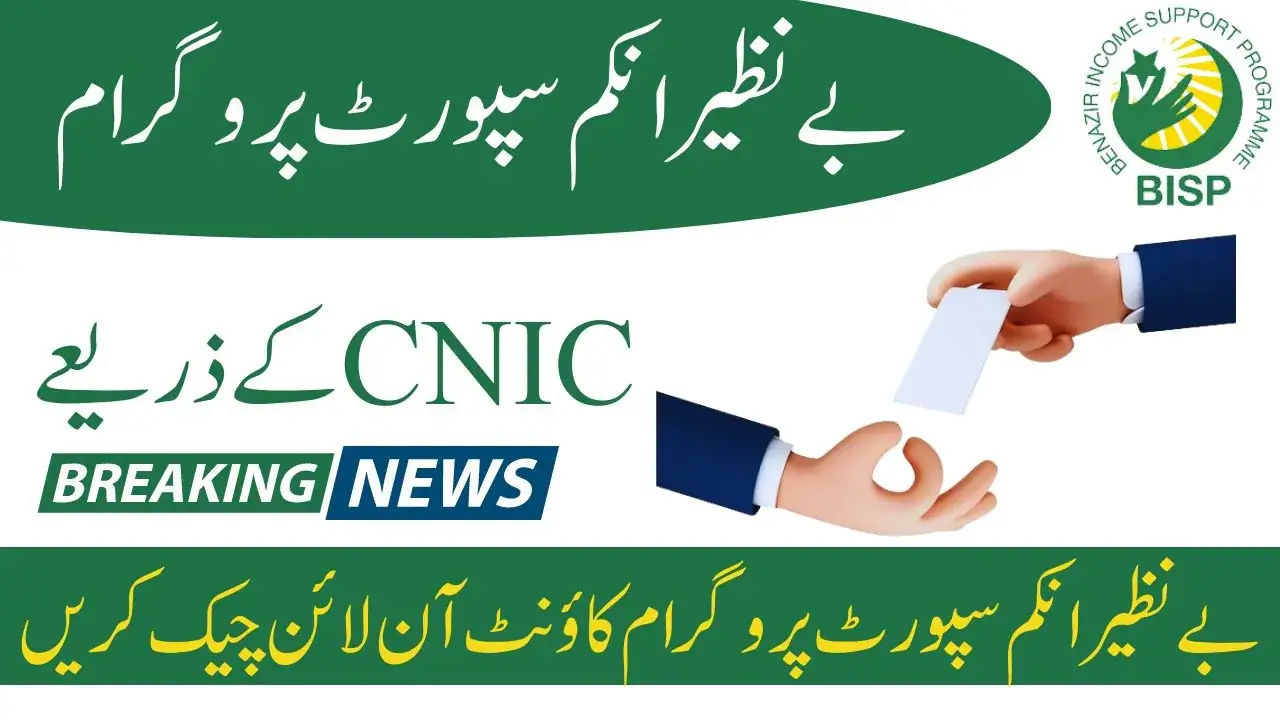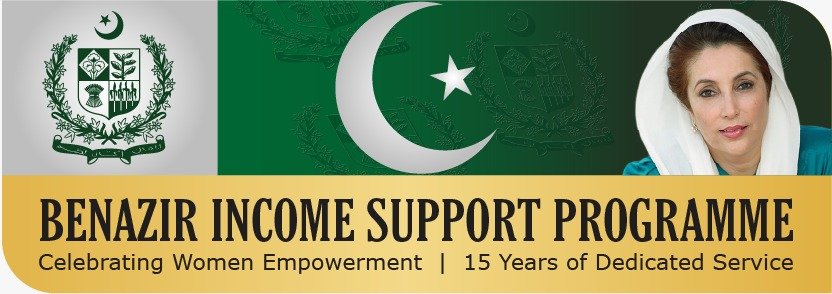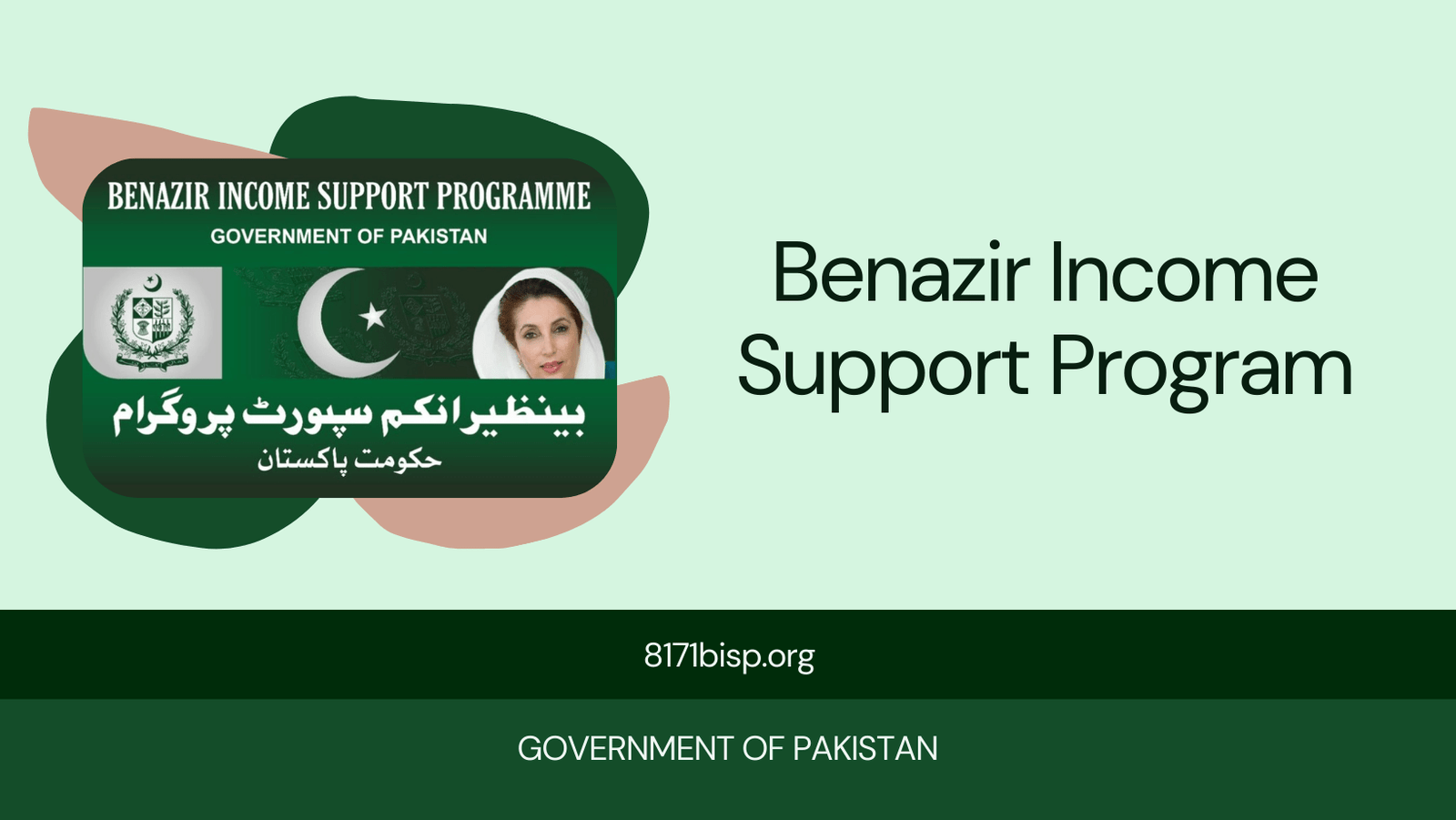The Benazir Income Support Program (BISP) is a federal unconditional cash transfer poverty reduction program in Pakistan. Launched in July 2008, it was the country’s largest single social safety net program with a cost of around Rs. In 2016, 90 billion rupees were distributed among 54 lakh beneficiaries.
The program distributed an annual amount of 19,338 rupees (or about $195) per month in 2016. The stipend is linked to the Consumer Price Index and is paid through a smart card. The United Kingdom Department for International Development is the largest foreign supporter of the program, providing $244 million (or 27%) of total funding in 2016, with the remainder provided by the Government of Pakistan.
A separate ministry, the Ministry of Poverty Alleviation and Social Security (PASS) was established. The Benazir Income Support Program was part of the Poverty Alleviation and Social Security Division. Benazir Income Support Program (BISP) has also introduced BISP 7000 cash program for beneficiaries across Pakistan and also announced the Benazir Kafalat programme.
History of Benazir Income Support Program
The Benazir Income Support Program was established in 2008 by Yusuf Raza Gilani on the advice of President Asif Ali Zardari. The name of the program is a tribute to former Prime Minister and President Asif Ali Zardari’s wife Benazir Bhutto who was assassinated in 2007.
Since 2005, the purchasing power of many Pakistani families has been eroded by high inflation and rising food and oil prices. BISP came up in this background as a means to address the decline in purchasing power. Along with the program’s economic development goals, BISP seeks to empower women by offering direct cash transfers to female household members.
BISP is currently Pakistan’s largest aid program and the government’s third-largest budget allocation. BISP expenditure is 0.3% of Pakistan’s GDP.
In the 2008-2009 fiscal year, more than 3 million Pakistani families received cash transfers through BISP. This number is 1.5% of the general population and 10% of the population below the poverty level. For the 2009-2010 fiscal year, the program was expanded to cover 5 million low-income families. At the program’s inception in 2008, the Pakistani government allocated RS 34 billion, or $425 million, to BISP. In the following year, the allocation doubled to 70 billion rupees, or $875 million.
The Benazir Income Support Program is planning to launch a new initiative that encourages human capital development through conditional cash transfers. The education resource initiative will make cash payments conditional on primary school enrollment of children from eligible families. On 18 June 2017, BISP launched an e-commerce platform for its beneficiaries.
Program structure
Benazir Income Support Program has been implemented in Punjab, Sindh, Balochistan, and Khyber Pakhtunkhwa provinces. The program also operates in the Federally Administered Territories of Azad Jammu and Kashmir and the Islamabad Capital Territory.
In its first year of operation, recipients of BISP cash transfers were identified and selected by Members of Parliament through a recommendation process. Each MP received 8,000 forms to distribute in their constituency. Selected candidates have undergone an eligibility verification process by the National Database and Registration Authority. A final list of eligible families was prepared and sent to the Postal Service. Funds were disbursed directly from the Treasury to the Postal Service and then delivered to female heads of eligible households.
In April 2009, the process of identification and selection of eligible families was completed by recommendation of parliamentarians. The identification process has been reformed and now uses a poverty scorecard. Households are identified using the proxy means test using the Poverty Scorecard. The Poverty Scorecard is approved by the World Bank and requires households to answer 13 questions about assets and expenses in a survey. The poverty survey has been piloted in 16 districts and will be rolled out across the country.
An internal monitoring system is being developed to track remittances and payment amounts to eligible families. Another mechanism is being considered to combat corruption and political bias that would allow an impartial third party to verify eligibility to the list of eligible families.
Recently, BISP has expanded to include several special initiatives. The Wasila Haq program empowers women through the provision of small loans. A vocational training program, Seelas Rogga, provides up to 1 year of vocational training to eligible family members. The Wasilla Health Program specifically provides financial assistance for access to primary health care. BISP will launch its first program that makes cash payments conditional on schooling. The Seela Education initiative will require families receiving cash payments to enroll children aged 5 to 12 in primary education.
BISP also provides cash payments for emergency relief efforts. These payments are similar to those received by low-income families but are distributed to families affected by terrorism, war, and natural disasters such as earthquakes.
Eligibility
To be eligible for cash payments under BISP, families must earn less than Rs 6,000 per month. The equivalent of $67. Further eligibility requirements state that:
- The family must have a female applicant with a valid identity card.
- An individual applicant must be a widow or divorced woman with no male family members.
- Eligible families include persons who are physically or mentally disabled.
Families considered ineligible for cash payments by BISP include:
- Employees of the Pakistani government, military, or any other government-affiliated agency.
- Members in receipt of pension or post-retirement benefits from Govt.
- Family members own more than 3 acres of cultivated land or more than 80 square yards of residential land.
- Members earn income from other sources.
- Members holding machine-readable passports.
- National Identity Card Holders for Citizens Abroad.
- Members with bank accounts other than microfinance banks and caregivers of low-income families.
Benefits of Benazir Income Support Program
Eligible families get a quarterly cash payment of Rs.8500. This amount increases the purchasing power of families earning around Rs 2,800 per month by 20%. Most low-income families spend 50-70% of their total income on food alone. According to BISP, a cash payment of Rs 8,500 per quarter, or Rs 2,833 per month, would allow a family of 5-6 people to buy 20-25 days worth of flour.

Criticism of Benazir Income Support Program
Since the program’s inception, critics have pointed out numerous flaws in the design of the Benazir Income Support Program. Some claim that Rs 3,000 per month, or Rs 1,500 per month, is not enough to lift poor families above the poverty line as it would require Rs 2,550 per month. Another major flaw with BISP is its lack of provisions.
Conditional cash transfer programs have been more successful in Latin America because recipient families must meet certain requirements before receiving cash payments. These programs allow recipients to enroll their children in primary education. Develop human capital by requiring attendance at health and nutrition seminars, and meeting with health care providers. BISP programs also seem to be moving in this direction as both educational and non-academic components are conditional, requiring a change in the behavior of beneficiaries seeking both health and education.
The unconditional cash transfer component of BISP, formerly known as Kafala, is also designed to encourage savings that would otherwise be offset by government subsidies.
Some experts have argued that by attaching conditions to social safety net programs, they move away from the concept of a negative income tax originally proposed by Milton Friedman and assume that beneficiaries are a behavior by which is responsible for their poverty while ignoring the deep-rooted structural inequalities in society that can limit an individual’s ability to participate effectively in the labor market.
One such example from Pakistan is that of transgender women who will be barred from accessing the labor market in any meaningful way unless the society around them changes.
He has also been accused of corruption and political interests. According to some estimates, only 50-60 percent of beneficiaries receive cash payments from BISP. The previous method of identifying families recommended by MPs was flawed. Many have claimed that MPs only recommend their family and friends to receive cash.
It has been pointed out that geographical areas dominated by the ruling Pakistan People’s Party have a disproportionate number of families receiving BISP assistance. For example, Multan, the prime minister’s hometown, has twice the number of people receiving BISP payments as opposition party stronghold Lahore. Punjab, another region dominated by opposition parties, has the lowest proportion of eligible families—1,974 for every 100,000 people; 6,829 families per 100,000 people in ruling party stronghold Sindh.
Beneficiaries have also complained that the postal service charges an extra Rs 100 to Rs 200 for each payment delivery. Other critics argue that since the Benazir Income Support Program constitutes a large portion of the Pakistani government’s budget, an impact assessment should be conducted to assess the program’s benefits and real needs.
FAQ’s
- How do I check my Bizarre Income Support through CNIC?
You can use your smartphone, laptop, or PC to check your Benazir Taleemi Wazifa online. Open https://8171.bisp.gov.pk/ website. Enter CNIC or National Identity Card number. Check the digits and enter them as a captcha
- How to apply online for BISP?
How do I register online for BISP? www.bisp.gov.pk Online Registration 2021 Benazir Income Support Program portal is fully functional for online registration purposes. Already registered persons can check the application status by sending an SMS to 8171. BISP Registration Online 2022.
- How to Check the BISP Education Scholarship through CNIC?
- Open https://8171.bisp.gov.pk/ website.
- Enter CNIC or National Identity Card number.
- Check the digits and enter them as captcha.
- Submit your ID number and check your status.
“>


4 thoughts on “Benazir Income Support Program”